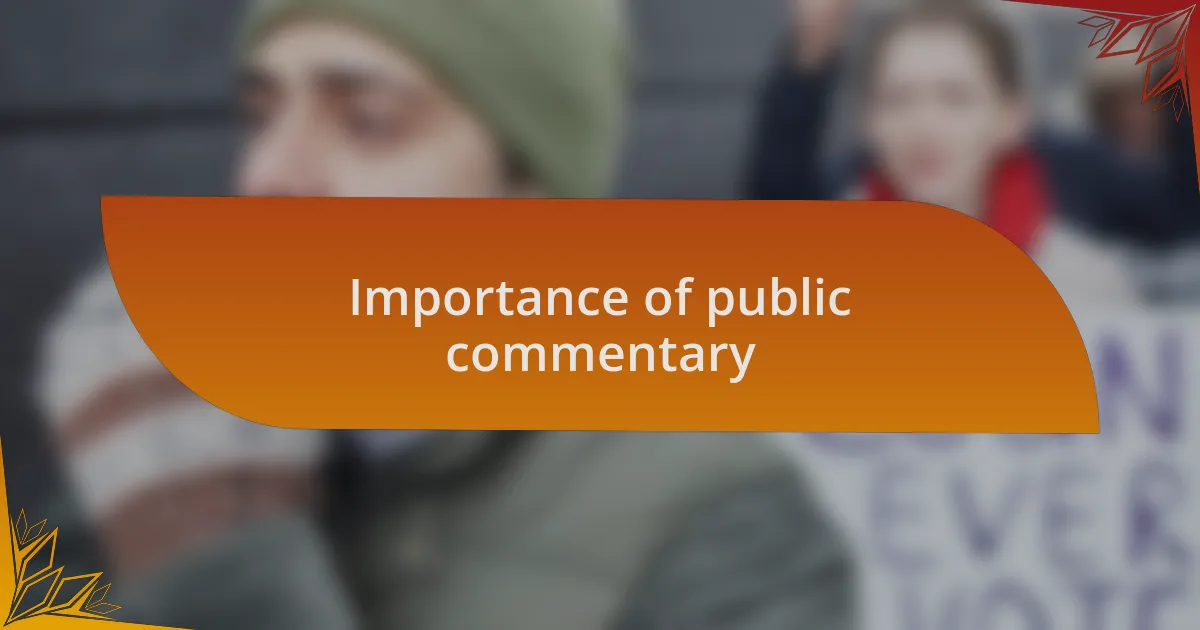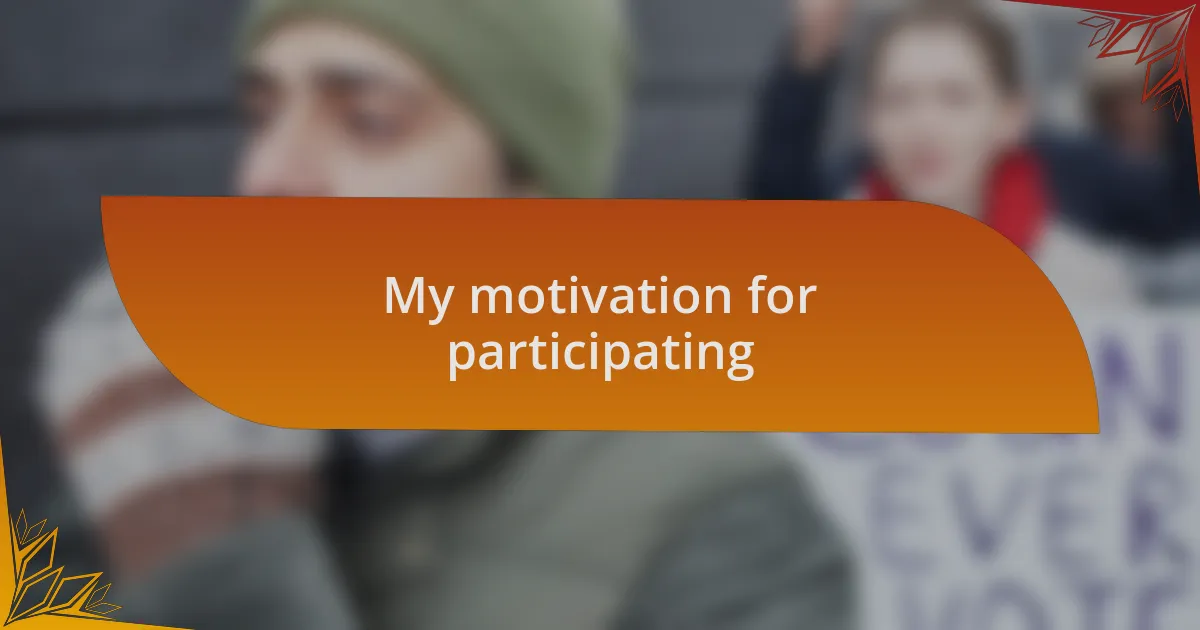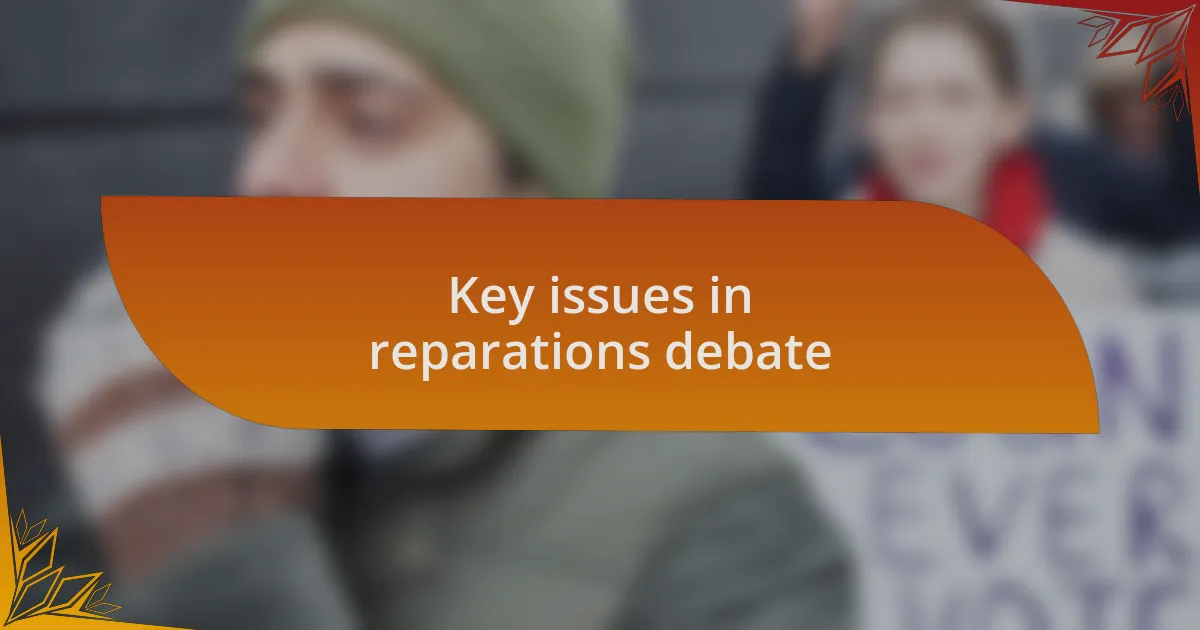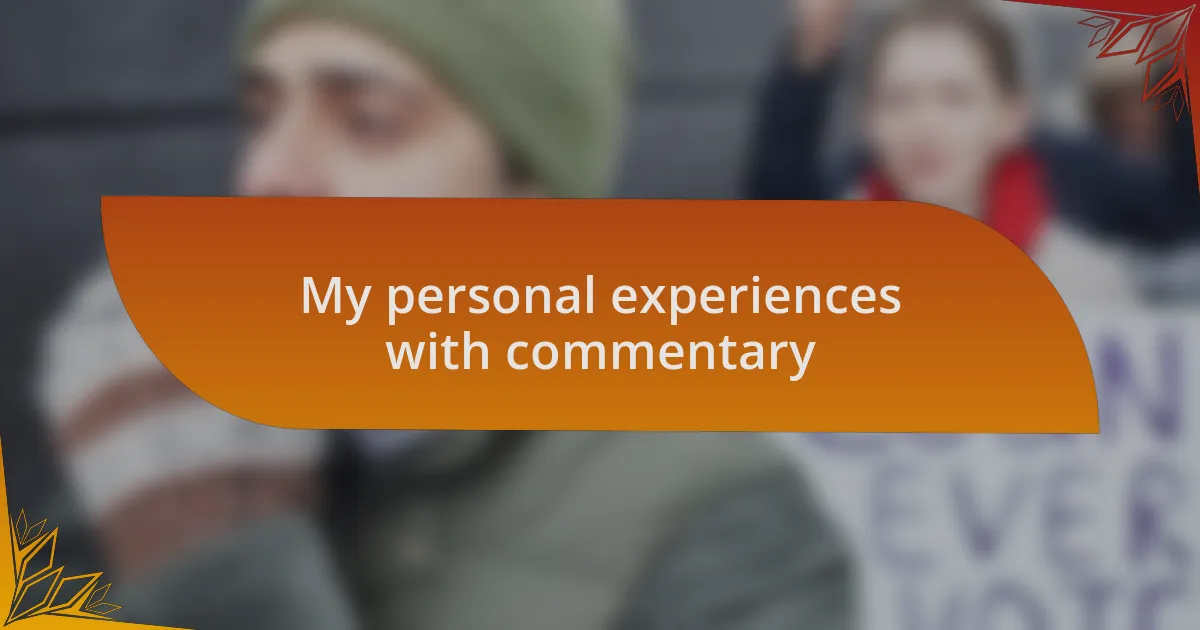Key takeaways:
- Reparations politics requires recognition and validation of historical injustices, making community narratives essential for understanding and advocacy.
- Public commentary amplifies marginalized voices and encourages empathetic connections, transforming abstract discussions into relatable experiences.
- Engagement in reparations discourse fosters personal growth, challenging biases and creating meaningful connections through shared vulnerability.
- Listening and persistence are crucial in navigating contentious discussions, as they help build a more inclusive dialogue about reparations.

Understanding reparations politics
Reparations politics is a complex and deeply emotional topic that often elicits passionate responses from various communities. I remember attending a town hall meeting where a woman stood up to share her family’s history and the lingering effects of generational trauma. Hearing her story made me reflect on how reparations can serve not just as a financial remedy, but as a path toward acknowledgment and healing.
When discussing reparations, I often find myself pondering: What does justice truly look like? This question is vital because, for many, it means more than just monetary compensation; it’s about recognition and validation of their struggles. I’ve seen communities come together, sharing their narratives and advocating for policies that address long-standing historical injustices, and it’s clear to me that this movement is about restoring dignity.
The conversations surrounding reparations are frequently polarized, with advocates and critics often talking past each other. I’ve experienced this firsthand in discussions with friends who have differing views, leading me to realize that education and empathy are crucial. By fostering understanding through personal stories and tangible examples of harm, we can bridge gaps and create a more informed dialogue around reparations politics.

Importance of public commentary
Public commentary plays a pivotal role in shaping the discourse around reparations politics. I recall an engaging online forum where participants shared their views; the diversity of perspectives highlighted how personal experiences can frame our understanding of complex issues. It hit me then how these discussions not only amplify marginalized voices but also encourage us to confront uncomfortable truths.
In my own journey, I noticed that when people openly share their stories, it creates a space for empathy and connection that’s often missing in traditional political debates. One memorable moment was when a speaker recounted her family’s struggle with systemic injustices, and you could feel the room’s collective understanding deepen. This led me to wonder: how can we foster more of these moments to transform abstract concepts into relatable experiences?
Moreover, public commentary serves as a reminder that reparations are not merely policy debates but deeply personal matters affecting people’s lives. I remember a time when a friend bravely articulated her apprehensions about reparations; her honesty sparked a rich dialogue that left us all reflecting on societal responsibilities. It reinforced my belief that these discussions not only educate but also motivate action, making our conversations about reparations vital for fostering social change.

My motivation for participating
My motivation for participating stems from a deep sense of responsibility to be an advocate for those who have historically been silenced. I vividly remember attending a community meeting where older activists passionately recounted their experiences with systemic inequality. Witnessing their bravery inspired me to step up and share my own views, which felt like a small but significant contribution to a much larger conversation.
It’s not just about expressing my thoughts; it’s about standing in solidarity with those who have been marginalized. I once found myself in a discussion where I shared my family’s history with racial discrimination, and the immediate connection with others who had similar stories was powerful. This shared vulnerability reinforced my belief that personal stories can ignite change and resonate with audiences in ways statistics alone cannot.
I often reflect on what it means to be part of this collective narrative. When I participate in public commentary, I ask myself how my voice might influence the dialogue around reparations. I’ve come to realize that every contribution, no matter how small, helps build a richer, more inclusive dialogue that acknowledges the pain and resilience of our communities. How can I not engage when the stakes are so high and the potential for impact so profound?

Key issues in reparations debate
The debate surrounding reparations often centers on the question of who qualifies for compensation. When I first delved into this discussion, I was struck by the complexity of identity in the context of historical injustices. It’s not just about race; many factors, including socioeconomic status and cultural heritage, play a significant role in defining eligibility. How do we ensure that we honor all narratives while also acknowledging the distinct experiences of Black Americans? This challenge requires a nuanced understanding that can sometimes feel overwhelming.
Another key issue is the method and form of reparations. In one of my discussions within activist circles, opinions varied widely—from direct financial compensation to community investments and educational initiatives. I recall a poignant moment when a friend passionately argued that education must be at the forefront, as it empowers future generations. But I couldn’t help but wonder, can education alone truly address the deep-rooted disparities that persist today? Balancing these various perspectives is essential for crafting a reparations strategy that is effective and just.
Finally, the political landscape heavily influences the reparations conversation. I often find myself contemplating the power dynamics at play when lawmakers discuss policies that could affect our communities. In a recent town hall meeting, it became evident how crucial it is for constituents to voice their opinions—especially those directly impacted by historical injustices. As I listened to community members share their hopes and fears, I realized that advocacy isn’t just about policy; it’s about creating a sense of urgency for change that resonates with all of us. How do we keep this momentum alive in a political climate that often feels indifferent? The answer lies in sustained engagement and relentless advocacy.

My personal experiences with commentary
Navigating the landscape of public commentary on reparations has been a profoundly personal journey for me. I still remember the first time I shared my thoughts at a community forum; my voice trembled as I spoke about the injustices faced by my ancestors. That experience was eye-opening—it was not just about my perspective but also about how deeply the topic resonated with others in the room. It made me realize that each person’s story adds to the tapestry of our collective narrative.
Engaging in this dialogue has often forced me to confront my own biases and assumptions. During a panel discussion, a participant challenged me to consider how historical injustices impact not only Black Americans but also other marginalized groups. At first, I felt defensive, but that moment sparked an ongoing reflection in me. How do we broaden our definitions of reparations to be more inclusive, while still being mindful of specific historical harms?
I’ve also experienced moments of frustration when facing dismissive attitudes toward the reparations issue. After writing a commentary piece, I was met with a wave of backlash on social media. Rather than disheartened me, it fueled my passion to engage more deeply with those resistant to the conversation. It begs the question—how do we reach individuals who feel disconnected from the emotional weight of our history? For me, the answer lies in patience, empathy, and prioritizing open dialogue.

Lessons learned from my journey
One crucial lesson I’ve gleaned from my journey is the importance of listening. I vividly recall attending a local town hall meeting where, instead of preparing my rebuttal, I chose to truly hear the anecdotes of others. That simple shift changed my perspective; I found that understanding others’ experiences enriched my own arguments and provided a more comprehensive view of the reparations narrative.
I’ve also learned that vulnerability can lead to powerful connections. There was a moment when I bravely shared my family’s history of trauma, exposing the raw emotions tied to it. Surprisingly, this openness invited others to share their stories, creating a communal sense of healing. It made me wonder—how often do we allow ourselves to be vulnerable in these discussions?
Lastly, I’ve discovered the value of persistence in the face of criticism. After one particularly harsh backlash on my viewpoints, I felt the sting of doubt creeping in. However, I recognized that backlash often signals the necessity of continued discourse. The question then became: how do I transform that negativity into constructive dialogue? Each experience has reaffirmed my belief that progress often lies beyond discomfort and dissent.